Can A Golf Shirt Help You Play Better?
I don’t know if a golf shirt can help you play better, but a poor fitting golf shirt can definitely assist you in posting a big number (at least that is one of the excuses that I occasionally pull out). In the past I have covered some golf shirt technology and suggested that it may become the next Olympic swimsuit controversy. Today I have the pleasure of sharing with you an interesting Nike patent that recently issued as USPN 7,934,267 titled “Articles of Apparel Providing Enhanced Body Position Feedback.” The patent describes the invention as:
Articles of apparel include: (a) a garment structure having one or more fabric elements structured and arranged to provide a close fit to at least one predetermined portion of a body (e.g., area(s) of the body for which enhanced position sensing and/or feedback are desired, such as the lower back, the arch of the foot, etc.); and (b) a body position feedback system engaged with or integrally formed as part of the garment structure. The body position feedback system may apply higher tensile or constricting (compressive) forces to selected portions of the wearer’s body, which can help stimulate or interact with nerves and deep tissue receptors located in various portions of the body. The increased forces at selected locations of the body give the wearer sensory feedback regarding the position or orientation of these parts of the body and can improve or accelerate development of “muscle memory.”
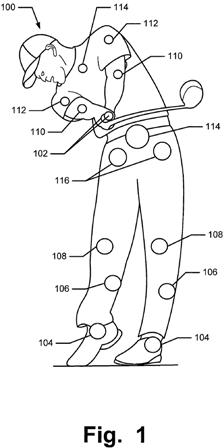
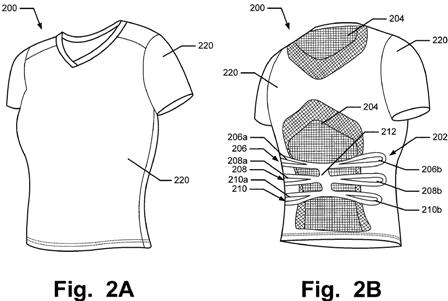
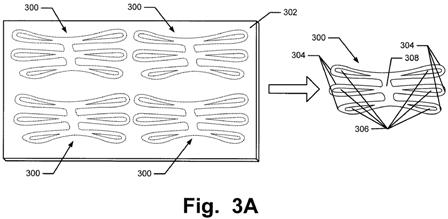
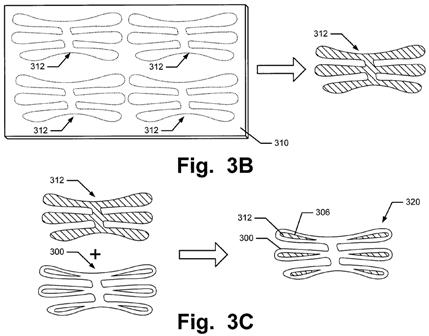
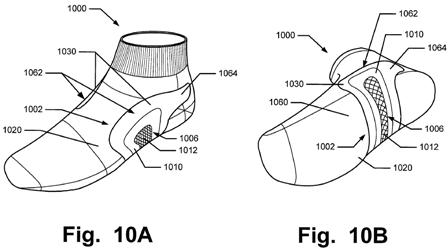
The patent goes on to explain:
As described above, humans cannot readily “feel” the locations of various parts of their body in normal body posture or positions and/or during typical motions or activities. For example, a human’s back, and particularly the lower back, has a relatively sparse “touch sensing” neural population. The human body core, its positioning, and its motion (including the back), however, are very important for many athletic activities. For example, the body core is a center point of rotation and power generation in a golf swing. Moreover, being able to repeatedly place the body in the proper posture and correctly position the body at the beginning of and over the course of the swing are critical to developing a consistent and repeatable swing (and thereby improving one’s golf game).
FIG. 1 illustrates a golfer 100 in mid-swing. Body positioning at the beginning of the swing (e.g., posture at the address position) and over the course of a swing can be very important to the results achieved. FIG. 1 illustrates various zones or areas of the human body, the positions of which during at least some time during the swing can be important to the results achieved. For a golf swing, these important zones include: the hands 102; the feet and ankles 104; the calves 106; the knees 108; the arms 110; the shoulders 112; the sacrum (lower back) and core 114; and the hips 116. Assistance in properly positioning one or more of these zones at various times during the golf swing (e.g., posture at address, other times over the course of a swing, etc.) can greatly assist in helping athletes repeatedly place the body in the proper posture and correctly position the body over the course of the swing.
Aspects of this invention relate to garments that help make wearers more aware of the positioning of various selected parts of the body, e.g., due to enhanced stimulation of nerves, joint mechanorecptors, and/or deep tissue receptors at the selected parts of the body. Garments can be designed to closely fit (and optionally at least partially wrap around) one or more of the various areas or zones described above in conjunction with FIG. 1. Additionally, such garments can include body position feedback enhancing structures or regions, e.g., that apply a compressive force along or around various parts of the body (and resist tensile elongation), to enhance somatosensory feedback relating to the position of various parts of the body adjacent the enhanced feedback area of the garment and enhance user “awareness” of the position of these various parts of the body. Such improved “awareness” can help athletes better position themselves, develop “muscle memory,” and maintain better positioning over time.
Advantageously, in accordance with at least some examples of this invention, the body position feedback structures or regions will include juxtaposed regions in which compressive forces are applied and regions in which compressive forces are not applied. The differential in the applied compressive forces at the adjacent regions tends to enhance the wearer’s feel and awareness of the body position at these locations. Various structures and ways of creating this differential in applied compressive forces at adjacent locations will be described below.
As mentioned above, aspects of this invention relate to body position feedback systems that may be used with or integrated into articles of apparel, such as upper and/or lower torso clothing (e.g., shirts, blouses, tank tops, leotards, leggings, form fitting garments, pants, shorts, skirts, undergarments, etc.); socks or other garments that at least partially contain a human foot or leg; gloves or other garments that at least partially cover or contain at least a portion of a human hand or arm; etc. Special garments may be provided to at least partially contain or fit over or against the desired part of the body, such as a sleeve or wrap for insertion of a leg or arm, garments or wraps to contain or cover any of the areas illustrated in FIG. 1, etc.
I am not sure I like the sound of “enhanced stimulation of nerves, joint mechanorecptors, and/or deep tissue receptors at the selected parts of the body,” but I would pay a lot for a shirt that can prevent me from chunking a wedge at 100 yards in the middle of the fairway!
Dave Dawsey – Golf’s Apparel Patent Attorney
